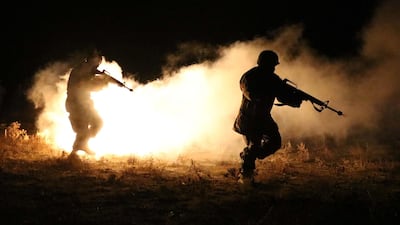Australian Special Forces were allegedly involved in the murder of 39 Afghan civilians, according to a report released on Thursday after an investigation lasting more than four years.
Afghanistan President Ashraf Ghani said on Thursday that Australian Prime Minister Scott Morrison called him overnight, before the release of the report, and expressed “his deepest sorrow over the misconduct by some Australian troops” in Afghanistan.
Mr Morrison told Mr Ghani that future investigations into the allegations would ensure justice.
Mr Ghani’s office also said Australian Foreign Minister Marise Payne had written and apologised for the misconduct of troops.
The inquiry was led by the assistant inspector general of the Australian Defence Force Maj Gen Justice Paul Brereton and examined allegations that some soldiers in Australia’s elite Special Air Services and commando regiments killed Afghan civilians, planted weapons on victims, and executed prisoners to initiate or “blood” junior soldiers.
Australian historian and lecturer on asymmetrical warfare and counter-insurgency, Dr Philip Chilton, told The National that it was "no coincidence" that "these atrocities are being carried out by Special Forces".
“They are bred to have a warrior culture – and this is covered in the report – and if you have that you will have things like ‘blooding’. You can’t have Special Forces that are trained to be expert killers in a way that regular soldiers aren’t and expect them to do anything other than commit war crimes,” he said.
Justice Brereton described the Special Forces’ actions as disgraceful and “a profound betrayal” of the Australian Defence Force.
The report found Special Forces were responsible for dozens of deliberately concealed unlawful killings, mostly involving prisoners.
None of the killings took place in the heat of battle; all of the 39 victims were either non-combatants or were no longer combatants. Twenty-five service members, including some who are still serving, have been identified either as principals or accessories in the crimes.
The report recommended that the Chief of the Defence Force, Angus Campbell, refer 36 matters to the Australian Federal Police for criminal investigation.
“The nature and extent of the misconduct allegedly committed by ADF members on operations in Afghanistan is very confronting,” Inspector General of the Australian Defence Force J M Gaynor wrote in the transmittal letter to Gen Campbell.
“The report discloses allegations of 39 unlawful killings by or involving ADF members. The report also discloses separate allegations that ADF members cruelly treated persons under their control.”
Mr Chilton said it was problematic that the report appeared to “exonerate the higher command for responsibility for any of this”.
“The report says higher command is not responsible, and places blame on the NCOs. Who is overseeing them? Where is the oversight of these officers?”
The report said that the practice of blooding a new soldier typically involved the soldier being “directed to kill the person under control” [the prisoner] by the patrol commander.
“Throwdowns [weapons, radios and other equipment] would be placed with the body and a ‘cover story’ was created for the purposes of operational reporting and to deflect scrutiny,” the report said.
Gen Campbell vowed to act on the Brereton report’s “shameful”, “deeply disturbing” and “appalling” findings.
He said he accepted all 143 recommendations, including referring individuals to the office of the special investigator to consider potential criminal cases, because it was his duty “to set things right”.
Australian Defence Minister Linda Reynolds referred to “grave failings” detailed in the report and said “the Chief of the Defence Force must now comprehensively respond” to “a range of very serious matters”, but avoided commenting on the details of the findings.
Mr Chilton said he did not expect the soldiers responsible to face serious consequences.
"This government is not very good at getting its messaging right at the best of times, but in the end, I can't see anyone really facing justice for this. There may be charges pressed but I don't think anyone will face any kind of sanction. It will be a litany of horrors without anyone facing justice," he told The National.

